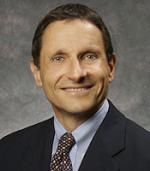Remarks from Kenneth Polonsky, M.D.
 Good afternoon,
Good afternoon,
I am honored to be here today to reflect on the remarkable accomplishments and contributions of our friend, colleague and mentor Dr. Joseph B. Kirsner. Joe came to the University of Chicago in 1935. At the time his specialty gastroenterology was in his own words “speculative, impressionistic, anecdotal, almost mystical at times”. The transformation of gastroenterology into a scientific discipline based on rigorous enquiry paralleled the evolution of Joe’s career and along the way he made many seminal contributions. He was a pioneer in understanding the nature and treatment of inflammatory bowel disease, and it’s immunology and genetics and was one of the first to show the increased risk of colon cancer in patients with ulcerative colitis.
Joe helped found the American Gastroenterological Association, the American Society for Gastrointestinal Endoscopy and the American Association for the Study of Liver Diseases. He also was a key player in the creation of the original General Medicine Study Section, a voluntary group of experts to advise the National Institutes of Health on the merits of grant applications. He published more than 750 papers and multiple editions of his highly regarded textbook, and trained many of the leading scholars in gastroenterology. Fortunately many remain at the University of Chicago as members of our faculty to maintain his legacy.
From my perspective Joe’s most enduring and important contribution was to demonstrate that the central element in the success of his academic program was outstanding patient care. Joe believed that if we really paid attention to the patient this would enable all other elements-education, and research which requires a robust clinical practice for controlled clinical trials as well as philanthropy which supports research and education. Joe put all these elements in place and everything depended on the fact that he was a really superb doctor. He was a master at ensuring that all his patients received only the very best care. I recall as a junior faculty member in Endocrinology the pressure that I felt when I was asked to consult on a JBK patient. When this happened I knew that I had to perform at the highest level and that there was no room for error. When it came time for patients to be discharged from the hospital Joe would summon all the consultants to the patients room and the plans for follow up after discharge were reviewed. Joe would lead the discussion like a maestro conducting an orchestra. At the end of the meeting we all knew exactly what was expected of us and what we had to deliver. Being involved in those meetings was an inspiration for me as a junior faculty member and taught me the importance of advocating for one’s patients a lesson that has had an impact on me for my entire career not just when I still had an active practice but also as Department Chair and now Dean.
Now those of you in audience who are members of our faculty know that one of the characteristics of all University of Chicago faculty is that they believe that they can do a better job than the Dean in running the BSD and the medical school certainly in certain elements. Joe was no exception. When I returned as dean approximately 2 years ago Joe who had just turned 100 came to see me. After reminiscing about old times together he got down to business which was to tell me that the Hospital had not been the same since he was no longer Chief of Staff and Deputy Dean for Medical Affairs and he offered to resume those responsibilities and run the clinical program for me. I did not quite know what to say so I said that I would think about it but suggested that he had earned the right to take it easy. Knowing Joe as we do you can all understand that he was not pleased with this suggestion and made this very clear to me.
In the 70 years since Joe first came to the University of Chicago no-one has made greater contributions to the eminence of the BSD, our medical school and hospital. He worked tirelessly on behalf of our institution and devoted his life to his work and his patients with a level of commitment that is most unusual. I feel honored to have had the opportunity to know and work with him and he had such an extraordinary impact that his legacy will live on for many years to come.
Thank you,
Kenneth Polonsky, M.D.

